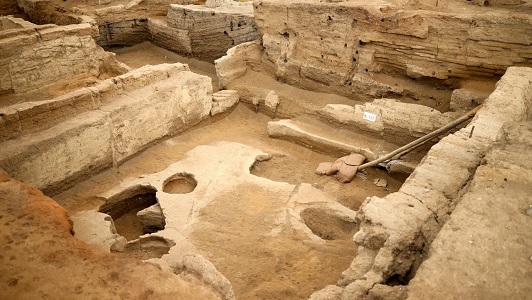*Dates Back 8,600 Years Archaeologists in Turkey say they have discovered the world’s oldest known bread, dating back to 6600 BC. A largely destroyed oven structure was found in an area called “Mekan 66,” where there are adjoining mudbrick houses, at the archaeological site of Çatalhöyük in the Continue Reading
Turks are voting in a momentous presidential run-off to decide whether or not Recep Tayyip Erdogan should remain in power after 20 years. His challenger Kemal Kilicdaroglu, backed by a broad opposition alliance, has billed the vote as a referendum on Turkey’s future direction. The president, who is favourite to win, promises a new era […]Continue Reading
Footballer Christian Atsu has been found dead under the rubble of his home almost two weeks after the Turkey earthquake, his agent has confirmed. Atsu, 31, had played for Chelsea and Newcastle in the Premier League. The Ghana international had not been seen since the quake that caused the collapse of the apartment in the […]Continue Reading
The death toll from a strong earthquake in south-eastern Turkey, near Syria’s border, could rise eight-fold, the World Health Organisation has warned. The toll, which currently stands at more than 3,400 people, has increased rapidly since the first earthquake struck early on Monday morning. About 12 hours later, a second powerful tremor hit further north. […]Continue Reading
Forty people are now thought to have died following an explosion in a coal mine in northern Turkey, the country’s interior minister says, Suleyman Soylu earlier said 58 people had been rescued from the mine and over a dozen remained trapped. Around 110 people were in the mine at the time of the blast on […]Continue Reading
Are you visiting Türkiye for the first time? Do you plan to spend this summer in any of the beautiful cities of Türkiye? Then, you need this information about the customary acts of Turkish people. First, let’s talk about greetings. Do you know how to greet a Turkish man or woman? Turkish people make salutations […]Continue Reading
Turkey has told the United Nations that, at the behest of its president, it wishes from now on to be called “Turkiye” in all languages, the UN announced Thursday. “The change is immediate,” Stephane Dujarric, the UN chief’s spokesperson, told AFP by email. He noted that Ankara’s official letter requesting the change had been received […]Continue Reading
Turkey has issued an international arrest warrant for the founder of a cryptocurrency trading platform. State media report that Faruk Fatih Ozer fled to Albania with an alleged $2bn from 391,000 investors. Police also arrested 62 people in simultaneous dawn raids in eight Turkish cities over alleged connections to Mr Ozer’s company, Thodex. Mr Ozer […]Continue Reading
Nine people have been killed after an oxygen ventilator exploded at a hospital treating coronavirus patients in southern Turkey, officials say. The blast caused a fire in the intensive care unit of the private Sanko University Hospital in Gaziantep, the local governor’s office said. At least one of the patients died while being transferred to […]Continue Reading
